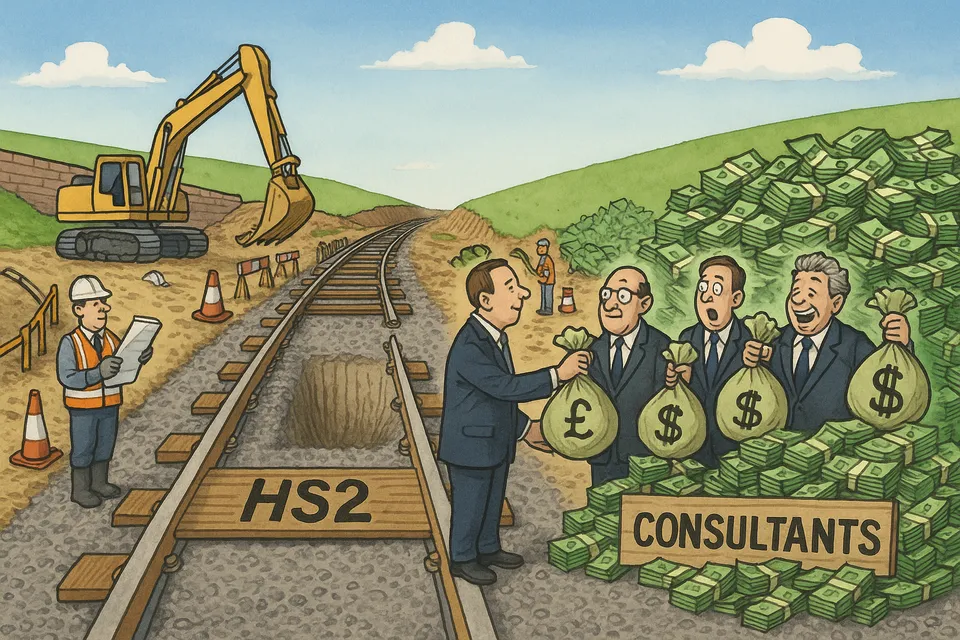HS2: A £100 Billion Monument to Institutional Failure

The Numbers Tell the Story
HS2 was supposed to cost £20 billion in 2012. It will now cost over £100 billion and won't open until at least 2035. The first trains were meant to run in 2026. That target became 2033. Now Transport Secretary Heidi Alexander admits there is "no reasonable way" to meet even that revised deadline.
What they claim: HS2 represents transformational infrastructure investment that will revolutionize British transport and demonstrate the country’s ability to deliver world-class projects.
What actually happened: A £20 billion railway has become a £100 billion construction site that won’t open for another decade, proving that British institutions cannot build basic infrastructure without catastrophic failure.
This is not a minor cost overrun or schedule slip. This is a 500% budget increase and a decade-long delay on what was sold as a transformational infrastructure project. The scale of failure is so complete that it has become a case study in how British institutions operate.
Wasting Money in the Dark
The details reveal institutional dysfunction that goes beyond mere incompetence. The government commissioned two separate designs for Euston station, rejected both, and spent £250 million on plans that will never be built. A £100 million tunnel was constructed to protect bats. Contracts were signed in direct contradiction of expert advice from a 2020 review that warned against proceeding without a settled scope.
When Rishi Sunak announced a ministerial taskforce to oversee Euston improvements, including ministers from Treasury, Transport and Levelling Up departments, that committee never actually met. Not once. Alexander called this “unbelievable,” but it perfectly captures how British government now functions: announcements without follow-through, committees that exist only in press releases.
Alexander told MPs there had been “insufficient ministerial oversight” and “too many dark corners for failure to hide in.” These are not accidental design flaws. This is how the system has been deliberately constructed to obscure accountability and enable waste.
The Pattern of Promises
Every new minister arrives promising to sort out the mess left by their predecessors. Alexander is following the script perfectly, announcing a “new era of leadership” and claiming her team “turned Crossrail into the Elizabeth line” so they can “do it again.”
But Crossrail itself was delayed by three years and went £4 billion over budget. The fact that it eventually opened is now held up as evidence of competence rather than the management failure it actually represents. This is how low British standards have fallen.
The promise to build HS2 “as safely and cheaply as possible, even if it takes longer” translates into plain English as: we have lost control of this project and will spend whatever it takes for however long it takes. Alexander admits it will be “a number of months” before she can even estimate final costs or timelines. On a project first announced in 2009.
Why This Keeps Happening
HS2 is not an isolated failure. It follows the same pattern as every major British infrastructure project of the past two decades: massive cost overruns, lengthy delays, reduced scope, and officials expressing surprise at outcomes that were entirely predictable.
The reasons are systemic. Political careers are built on announcing big projects, not delivering them. Ministers move jobs every two years on average. Civil servants face no meaningful consequences for failure. Contractors profit from scope changes and delays. The incentive structure ensures failure.
The Treasury model assumes that optimistic initial estimates will be met through “efficiency savings” that never materialize. When projects inevitably go over budget, the response is always to throw more money at the problem rather than question the underlying approach.
What Competent Countries Do
Other European nations build high-speed rail networks on time and on budget. Spain has built 3,500 kilometers of high-speed rail since 1992. France opened its first TGV line in 1981 and has been expanding systematically ever since. These are not examples of superior engineering. They represent functional institutions and competent project management.
The difference is accountability. When projects fail abroad, careers end. When they fail in Britain, ministers blame their predecessors and promise to do better next time. The cycle continues because there are no real consequences for failure.
The Real Cost
Beyond the financial waste lies a deeper institutional decay. Citizens are asked to trust government with their money for transformational infrastructure projects. When those projects fail repeatedly and spectacularly, that trust evaporates. Future infrastructure investment becomes politically toxic, creating a vicious cycle of decline.
HS2 was meant to demonstrate that Britain could still build great infrastructure projects. Instead, it has become proof that we cannot. Every delay and cost overrun reinforces the perception that British institutions are incapable of delivering what they promise.
Drawing Lines in Sand
Alexander’s promise to “draw a line in the sand” echoes every transport secretary since 2009. The line keeps moving. The sand keeps shifting. The project lurches forward because stopping would mean admitting the entire enterprise was misconceived.
The tragedy is not just the wasted money, though £100 billion could have transformed British transport infrastructure if spent competently. The tragedy is what this reveals about Britain’s institutional capacity. A country that cannot build a railway from London to Birmingham in less than 25 years cannot be taken seriously as a modern economy.
HS2 will eventually open, probably sometime in the late 2030s, at a cost that will likely exceed £120 billion. Politicians will attend the opening ceremony and declare success. The institutional failures that created this mess will remain unchanged, ready to destroy the next great infrastructure project.
That is the real decline: not just the failing projects, but the inability to learn from failure and the absence of accountability that makes the same mistakes inevitable next time.
Commentary based on HS2 delayed beyond 2033 as minister attacks ‘appalling mess’ by Gwyn Topham on The Guardian.